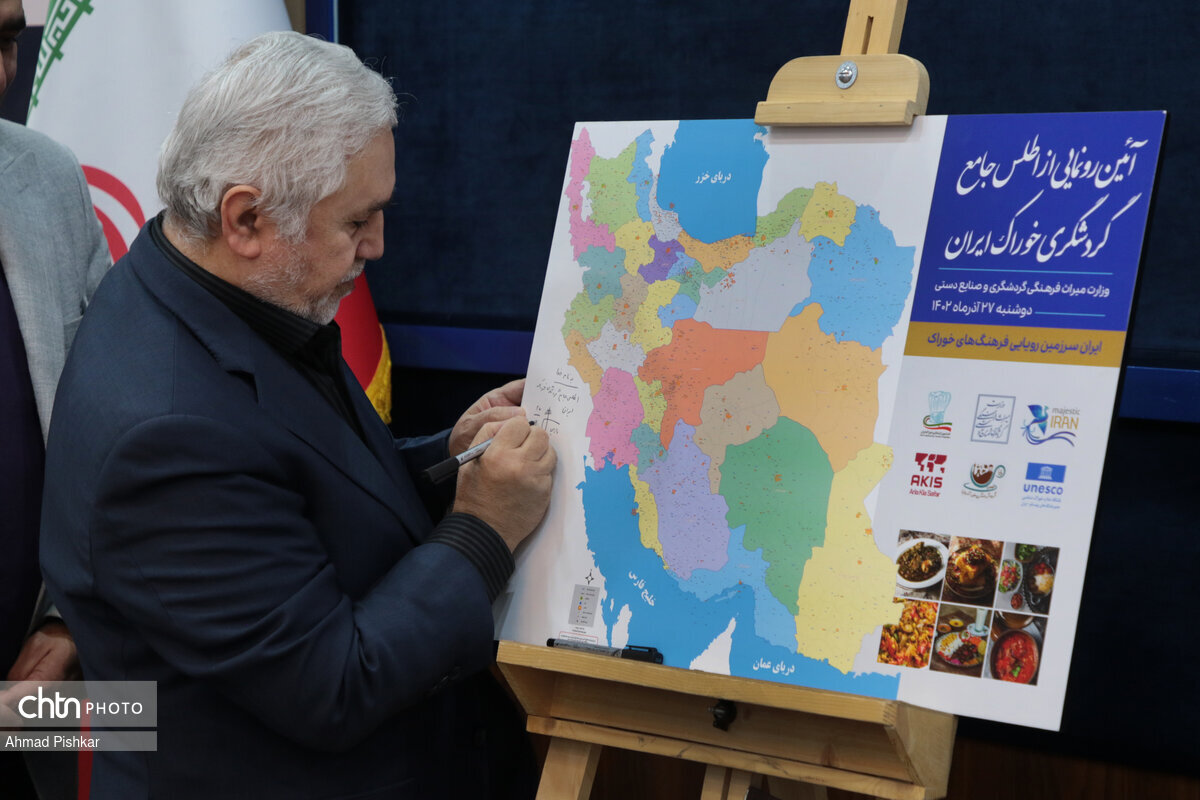Comprehensive atlas of gastronomy tourism unveiled

TEHRAN – A comprehensive atlas of gastronomy tourism in Iran was unveiled in a ceremony held at the headquarters of the Ministry of Cultural Heritage, Tourism, and Handicrafts on Monday.
The unveiling ceremony was attended by Ali Darabi, the deputy minister for cultural heritage, Alireza Izadi, who presides over the ministry’s heritage registration office, and Seyyed Mostafa Fatemi, who heads the department for domestic tourism development, among other officials and travel insiders.
Addressing the event, Darabi expressed gratitude for the imminent first anniversary of Yalda’s UNESCO registration while underlining the importance of gastronomy tourism.
Izadi highlighted the atlas’ importance, emphasizing its purpose to better introduce and preserve intangible heritage through meticulous collection and compilation.
Fatemi, for his part, underscored the significance of the guidebook, stating that various events dedicated to gastronomy have been initiated across different provinces to enhance the presentation of diverse culinary traditions.
“Over the past two years, more than 300 gastronomic tourism events have been held countrywide, some in collaboration with other countries,” Fatemi said.
Moreover, Fatemi highlighted the establishment of a comprehensive database within the Iranian food federation. He proudly mentioned the formation of a national culinary team, a first-time initiative that secured a gold medal during its inaugural participation in Armenia.
Experts believe the comprehensive atlas marks a pivotal step towards preserving and showcasing Iran’s diverse culinary heritage.
Iran, a land steeped in history, art, and culture, beckons travelers with not just its awe-inspiring landmarks but also a culinary journey that’s as diverse as the landscapes that adorn this ancient land. Among the many treasures Iran offers to visitors, its local foods and dishes stand tall as a testament to the nation’s culinary heritage.
From Tehran’s bustling streets to the remote villages nestled in the Zagros Mountains, Iran’s cuisine paints a vivid picture of its cultural mosaic. Despite the influx of global culinary influences, Iran’s culinary heritage remains deeply rooted in tradition.
In 2020, the Islamic Republic joined an online campaign launched by the UNWTO to promote gastronomy as an essential part of tourism. Iranian cuisine, usually dominated by fragrant herbs, varies from region to region. It principally accentuates freshness, deliciousness, and colorfulness.
No Persian meal is complete without an abundance of herbs. Every table is usually set with sabzi-khordan, a basket of fresh herbs, radishes, and scallions, which are eaten raw and by the handful. Persian cuisine is, above all, about balance — of tastes and flavors, textures and temperatures.
Experts believe that food tourism has become one of the most dynamic and creative segments of tourism and, at the same time, has naturally positioned itself as an element of diversification of tourism with a high impact on the promotion of sustainable development at the regional and local levels.
Iran’s local foods and dishes stand not just as a delight for the taste buds but also as a gateway to understanding its rich history, diverse culture, and the warmth of its people. Exploring Iran’s culinary tapestry isn’t merely a gustatory experience; it’s an immersive journey that connects travelers to the soul of this ancient land.
In a world where borders blur and cultures intermingle, Iran’s culinary heritage remains a distinct and cherished treasure—an invitation to savor the flavors that have stood the test of time.
AFM
